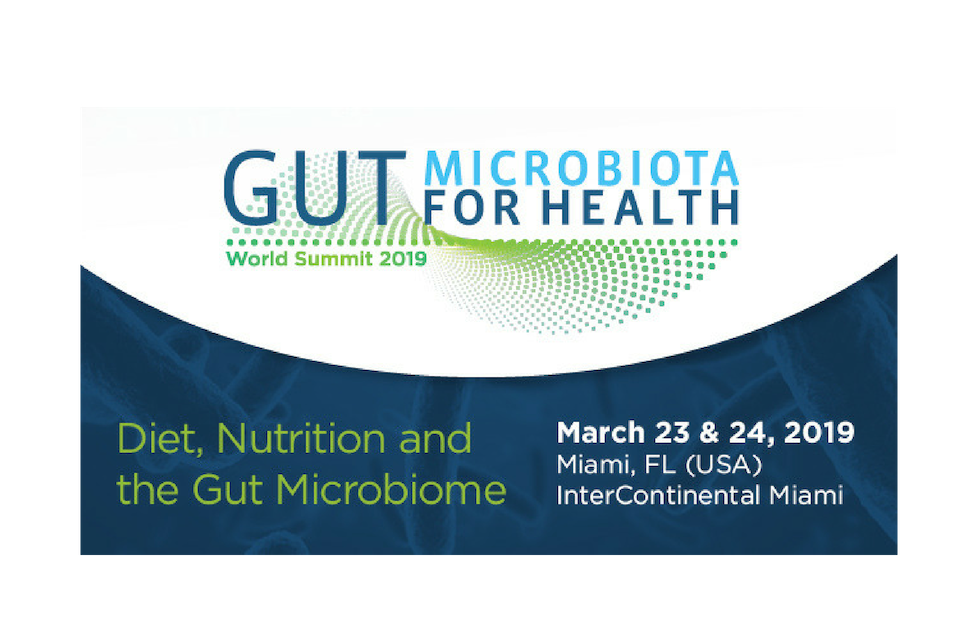Miami, Florida (March 23, 2019) — The gut microbiome is one of the fastest moving areas of science today. Twenty-three new abstracts highlighting the most cutting-edge advances in gut microbiome research will be presented at the eighth annual Gut Microbiota for Health World Summit, March 23 and 24, 2019, in Miami, Florida. This preeminent meeting on the gut microbiota is sponsored by the American Gastroenterological Association (AGA) and the European Society of Neurogastroenterology and Motility (ESNM) and will provide health care professionals with the latest evidence on the interaction between diet, nutrition and the gut microbiome.
Below is a summary of three of the most noteworthy abstracts to be presented at the 2019 Gut Microbiota for Health World Summit. Please contact media@gastro.org to speak with any of the investigators listed here or to receive the comprehensive abstract book. Attribution to the 2019 Gut Microbiota for Health World Summit, organized by the American Gastroenterological Association (AGA) and the European Society of Neurogastroenterology and Motility (ESNM), is requested in all coverage.
A new pathway to control inflammation in the gut
Study title: Microbiome-driven regulation of P-glycoprotein expression on the intestinal epithelium in maintenance of homeostasis
- Sage Foley, et al. University of Massachusetts Medical School
Significance: The authors have identified a new pathway controlling inflammation in the gut that is dependent on P-glycoprotein, which works to block neutrophils (a type of immune cell) from infiltrating the intestines and causing inflammation. Neutrophil infiltration is a key characteristic of inflammatory bowel disease. In mice, it was demonstrated that antibiotics reduce the presence of bacteria in the Clostridium class that produce butyrate — a molecule previously shown to induce expression of the P-glycoprotein gene. The authors conclude that these bacteria play a role in controlling the balance between health and disease by regulating the function of P-glycoprotein.
Diet may help prevent C. difficile infection in high-risk populations
Study title: Diet modulates Clostridioides difficile pathogenesis through host and microbe bile acid metabolism
- Keith Hazleton, et al. University of Colorado Anschutz Medical Campus and Children’s Hospital Colorado
Significance: The authors studied the impact of diet on susceptibility to Clostridioides difficile (C. difficile) infection, a potentially life-threatening infection affecting more than 500,000 people in the U.S. each year. In mice, they showed that mice fed a “Western” diet (high-fat/low-fiber) creates a pro-C. difficile environment in the gut. The authors conclude that a diet-based intervention may have potential to prevent C. difficile infection in people at high risk.
Prebiotics may prevent the effects of radiation treatment
Study title: Reduced oral nutrition contributes to gastrointestinal toxicity of total body irradiation via changes to the gut microbiome
- Robert R. Jenq, et al. University of Texas MD Anderson Cancer Center
Significance: The authors studied the impact of radiation on the gut microbiome and the intestinal barrier using a mouse model. In mice exposed to total body irradiation, changes in the gut microbiome were associated with thinning of intestinal mucus and an impaired intestinal barrier. These effects were prevented by the administration of a prebiotic supplement, indicating the potential of a nutrition-based intervention in patients treated for hematologic cancers.
###
Media contact: Rachel Shubert, rshubert@gastro.org, 301-272-1603
About the 2019 Gut Microbiota for Health World Summit
The eighth annual Gut Microbiota for Health World Summit will take place March 23 & 24, 2019, in Miami, Florida (U.S.) and will present the latest vidence on the interaction between diet, nutrition and the gut microbiome. This preeminent meeting on the gut microbiota is sponsored by the American Gastroenterological Association (AGA) and the European Society of Neurogastroenterology and Motility (ESNM) and endorsed by the American Neurogastroenterology and Motility Society (ANMS) and the European Society for Paediatric Gastroenterology, Hepatology and Nutrition (ESPGHAN), and is made possible through support from Danone (GMFH Founding Supporter), Sanofi (Sustaining Supporter), Bio-K+ International Inc., Rebiotix Inc, part of the Ferring Pharmaceuticals Group, and Seres Therapeutics (2019 Supporters). The scientific committee is co-chaired by Gail Hecht, MD, MS, AGAF, (Loyola University Medical Center, Chicago, Illinois, U.S.) and Francisco Guarner, MD, PhD (Vall d’Hebron University Hospital, Barcelona, Spain). Learn more at https://www.gutmicrobiotaforhealth.com/en/gut-microbiota-health-world-summit-2019/.
Follow along on Twitter: #GMFH2019.
About the AGA Institute
The American Gastroenterological Association is the trusted voice of the GI community. Founded in 1897, AGA has grown to more than 16,000 members from around the globe who are involved in all aspects of the science, practice and advancement of gastroenterology. The AGA Institute administers the practice, research and educational programs of the organization. www.gastro.org.
Like AGA on Facebook.
Follow us on Twitter @AmerGastroAssn
Check out our videos on YouTube.
Join AGA on LinkedIn.
About the Gut Microbiota & Health Section of ESNM
ESNM stands for the European Society of Neurogastroenterology and Motility, a member of United European Gastroenterology (UEG). The mission of ESNM is to defend the interests of all professionals in Europe involved in the study of neurobiology and pathophysiology of gastrointestinal function. The Gut Microbiota & Health Section was set up to increase recognition of the links between the gut microbiota and human health, to highlight the role of diet and nutrition and to spread knowledge and to raise interest in the subject. The Gut Microbiota & Health Section is open to professionals, researchers, and practitioners from all fields related to gut microbiota and health. www.esnm.eu.












